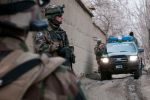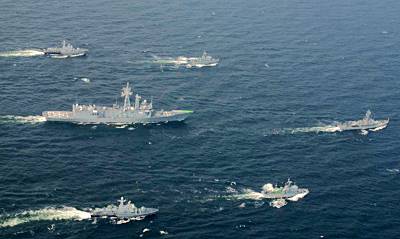NEJRAB, KAPISA PROVINCE, Afghanistan — Graduation is a time for celebration and pride in one’s accomplishments, but most of all, it signifies graduates are ready to put their knowledge to practical use. For the graduates of the Nejrab Afghan Local Police Department, knowledge gained from the Criminal Investigation and Detention Course will help Afghan security forces continue to take the lead in security operations.
Abdel Shafir, Nejrab Afghan Local Police Department captain, and his fellow Afghan police members presented their criminal investigation certificates to the audience, March 18, after completing the last part of their judicial education provided by French Military Forces, Gendarmerie Nationale (French military police), part of Task Force Lafayette.
“This final test is the conclusion of three months of hard work in a high-level classes,” said Capt. Emmanuel Leibovici, the Gendarmerie Nationale officer in charge of the course. “The graduating members included seven educated officers and non-commissioned officers of Nejrab Valley and the vicinity’s surrounding police departments. Their training included 50 hours of theoretical and practical police training, including criminal investigation and interrogation procedures.”
Designed to improve local police capabilities in criminal investigations and counterinsurgency, this judicial training matches real-life Afghan situations.
“It has been created in accordance with Afghan penal laws and under magistrate supervision,” said Col. Bruno Jockers, chief of the French military police here.
The training is paying off, as French forces are regularly partnering with Afghan police. In a recent collaboration, the Afghan Local Police arrested 10 suspects in Nejrab. Eight of the suspects were insurgents or close to the insurgency, and are now incarcerated.
In another successful mission, the ALP thwarted an insurgent attempt to kill a bodyguard of the Nejrab police chief. Afghan police leaders are hopeful that Afghan forces in Kapisa will soon manage the province independently.
For Afghan Col. Ata Mohammad, Nejrab police chief, the collaboration with the Gendarmerie Nationale is of great use.
“Crime is decreasing, and security in our valley is better than it was last year,” said Col. Mohammad during his awards ceremony speech. “The population trusts in the police forces more. I hope the time will come soon where we will assume responsibility for our destiny as our fathers did before us.”
“We are very confident … but we still have a lot to do,” said Col. Philippe Robin, Task Force Lafayette chief of staff. “Obviously, they need more equipment and more training, but their improvements are quite visible, more than we expected.”
Since late 2011, French mentors have applied the “Afghan First” concept that puts Afghan forces in the lead during combined operations.
“The purpose is to make Afghan National Security Forces confident enough to conduct operations by themselves,” Robin said, “so that we can verify that they will be able to lead operations alone as soon as possible. We will continue to work together with the ALP, ANA authorities, and government of Kapisa province to make the transition possible.”
Editor’s note: Task Force La Fayette is one of the nine task forces under the Regional Command East, including the Kapisa province and Surobi district. The French 27th Infantry Mountain Brigade, TF La Fayette, conducts counterinsurgency operations by, with, and through ANSF. It conducts its action along three lines of operations (security, governance and development) to protect and secure the population and assist the Government of the Islamic Republic of Afghanistan to extend its authority through competent governance, infrastructure development and security improvement.
Source:
Allied Command Operations
NATO

 von
von 
